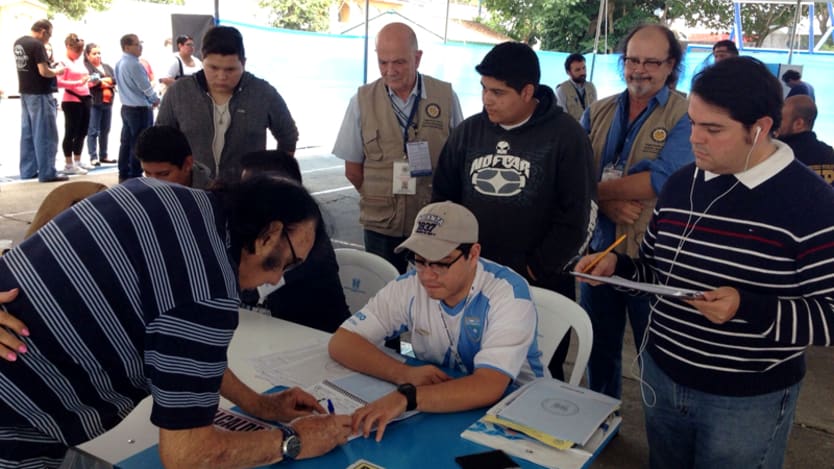
The recent election of Guatemalan President Jimmy Morales is an extraordinary moment in the country’s journey towards democracy. The state’s recent investigation of corruption involving the previous president and vice president, and the peaceful transfer of power to a political newcomer whose campaign centered on good governance are welcome developments indeed.
But the country’s new president and international donors should take pains not to overturn progress made during the previous regime on combating sexual violence.
When International Justice Mission began working in Guatemala 10 years ago, sexual violence against women and children was commonplace, but prosecutions and convictions of perpetrators extremely rare. In a five-year review of court files, IJM discovered that only 5.6 percent of 36,166 complaints of sexual assault cases — of adults and children — ever reached a verdict in the Guatemalan courts. Scrutiny of the cases showed that the biggest gap in justice system capacity was in the police investigation phase.
Child-friendly protocols
Over the past four years, Guatemala has officially adopted child-friendly protocols for investigations and prosecutions of abuse. Special reception centers for adult and child victims of sexual assault have been established in 14 prosecutors’ offices around the country. At these “one-stop shops,” forensic experts conduct medical examinations and collect evidence while prosecutors, a defense attorney for the accused, and judges stand by to receive the victim’s testimony.
A special court to prosecute rape cases was established in Guatemala City. And the Guatemalan police have trained 74 new agents to specialize in sexual assault investigations and are working to deploy units in and outside the capital. Most of the country’s judges and prosecutors have also received training from IJM in how to prosecute child abuse cases.
Increased professionalism and compassion
In recent years, it has been encouraging to see the justice system’s increased professionalism and compassion for victims. Take the case of our client Anaelí who, at the age of 11, was raped by three different men. The men threatened her and her little brother if they reported the crime and the truth did not emerge until Anaelí’s pregnancy as a result of the rape became obvious. Anaelí’s mother took the little girl to the Public Prosecutor’s Office to file a report. The case against one of the men who raped Anaelí concluded in April; he was sentenced to 13 years and four months in prison. The trials against the other two men continue.
The very fact that there was a responsive and accessible government office where a child’s rape could be reported is a tribute to Guatemala’s progress in recent years. Anaelí’s testimony against the accused was recorded in a “Gesell Chamber” — a child-friendly room where victims give their testimony to a social worker, shielded from the suspected perpetrator and court officials — and is further evidence of justice system reform.
These judicial innovations were initiated during the previous — now discredited — Otto Perez Molina government, and were a particular interest of former vice president, Roxana Baldetti, now in prison awaiting trial on corruption charges along with the former president. But Guatemalans are determined to defend and strengthen the new law enforcement institutions in the post-Molina era.
Over the past six months, some 16,000 Guatemalans signed a petition calling upon each of the presidential candidates to sign a “No Retrocedemos” (“No Turning Back”) pledge that commits them to using all the powers of the presidency to combat sexual violence. Significantly, the pledge included a commitment to expand and strengthen existing initiatives, including the sex crimes investigations department within the Specialized Division in Criminal Investigation. Eight of the 14 presidential candidates made the commitment, including Jimmy Morales.
An important ally
It is the Guatemalan government that is responsible for the protection of Guatemalan children, but the United States could be an important ally in the fight. In 2014, the U.S. Congress designated $3 million to support Guatemalan police sexual assault units from the State Department’s International Narcotics and Law Enforcement account. But the money, which hasn’t yet been disbursed, is only a fraction of what is needed to consolidate and strengthen Guatemala’s recent justice system improvements. The U.S. and other donors should support and scale the new police units, victim processing centers, and courts.
That Guatemala suffers from very high levels of violence, including sexual violence against children, is not news. But it is news that a poor country — struggling with gangs, narcotics trafficking, corruption, and the legacy of one of the most brutal military dictatorships in history — is nonetheless making a bold effort to build judicial and law enforcement infrastructure to protect children from sexual violence.
If Guatemala’s new president makes good on his campaign pledge, the country may become an unexpected model to other nations experiencing similar challenges.
Democracy Matters is a global conversation hosted by Devex, in partnership with International IDEA, to discuss accountability as a central element of deepening democracy. Visit the campaign site and join the conversation using #DemocracyMatters.
